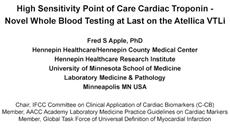- Partners for Progress in Oncology
- Accelerating Science Podcast
- Scientists' Choice Award® winners
- Blood testing
- Women in science
- SLAS
- Cell preparation, incubation & storage
- Microbiology & infectious disease
- Food safety & testing
- Cell culture
- Cancer research
- Cannabis testing
- Clinical laboratory diagnostics
- Mass spectrometry
-
More
Dr. Frank Peacock, MD, FACEP, FACC, FESC
Baylor College of MedicineFeatured technology
The Science Behind Heart Attack Detection: The Role of Cardiac Troponin
27 Feb 2018
W. Frank Peacock, MD, FACEP, FACC, Professor of Emergency Medicine and Research Director of Baylor College of Medicine’s Department of Emergency Medicine, describes the science behind diagnosing a heart attack (also called myocardial infarction). Learn about the methods used to measure cardiac troponin, a protein released into the bloodstream during a heart attack, and the benefits of sensitive new technologies for earlier detection in the emergency department.
My name is Frank Peacock. I'm a professor of Emergency Medicine, Baylor College of Medicine, Houston, Texas, and I'm the research director there. Baylor College is unique in that we have a large number of hospitals and physicians at those hospitals, and I work at Ben Taub, which is the large county hospital for Houston. Clinically, I'm an emergency physician and like most emergency docs, you see what comes in the door next.
My research is focused in cardiovascular care so that's my area of expertise, but like any emergency doctor, you have to see everybody. So, troponin is an extremely important molecule for the emergency department because it is the definition of myocardial infarction. And coronary artery disease is the number one killer of people in the industrialized world, it's the number one cause of death in the United States.
So, troponin is a structural protein, think of it as the bricks of your house for your heart. It does not leak, it does not come from other places. While there are other muscles that have troponin, the troponin that comes from the heart only comes from the heart. So, when troponin is increased, that means part of your structural proteins have gotten out of where they're supposed to be.
In other words, part of the heart had to die for that to happen. So, when we see an elevated troponin, our biggest concern is part of your heart has died. The way we measure proteins, and troponin is a protein, and this applies to all proteins, is we have an antibody that grabs on to it and then it will frequently have a fluorescent tag on the back that starts to glow so we can just measure how much glowing there is from your blood based on when the antibody grabs it.
The antibody you use is unique to whoever made it, and so consequently, different companies have different antibodies, and that's why we have different assays and each assay will have different definitions of normal because these antibodies behave differently. When a patient comes in, what we're trying to do is answer two questions, have you had a heart attack?
That's a yes or no question. And do you not have a heart attack, which is a different question. If you've had a heart attack, and you come in, it sounds like a heart attack, they say, "I've had chest pain, I'm short of breath, I'm sweaty, I threw up," sounds like a heart attack. I measure the troponin. It's really high. It's one and we're done. I diagnose you with a heart attack and you go down that treatment pathway of getting your heart attack taken care of.
If that same patient comes in and the troponin level comes back normal or undetectable, then the question is have they had a heart attack or not? And there's not an answer there. And the reason is that, when you have a heart attack, troponin leaks out from your heart into your bloodstream and then we measure your bloodstream. But two minutes after you have a heart attack, the level in your blood is so low we can't detect it.
We have to wait a certain amount of time until enough of it leaks out that we can actually detect it. So if you're really early, I don't care how good your assay is, we can't tell if you've had an MI or not because you haven't had time for the troponin level to get high enough that anybody's assay can detect it. And so we will measure it repetitively until we can see a rise, or until we get to the point where we know that if we go three hours into it, it hasn't risen, it's not going to rise ever and we're done, and you haven't had a heart attack.
So that's the two questions that we have to answer. Emergency doctors should love higher sensitive troponins because it allows us to identify the low-risk patient. And once I know you're low-risk, I don't need to keep you in the hospital. They also help us identify the high-risk patient, but any assay can do that.
If you have a very high level of troponin, you're high-risk, all assays could pick up high levels. But only the high-sensitivity troponins can pick up the low levels. If you look at the numbers on what will happen to patients who come to the ER with chest pain, it's about 20% will be found to have some kind of cardiac disease.
That means 80% will not. So we have 80% of the patients sitting around with nothing while we do blood tests on them until we're confident we can let them go. That's a lot of people. It's about almost nine million people a year sit around the ER in the United States waiting to leave. It's a huge cost. It's a huge inconvenience for the patient. It clogs up the ER, chest pain is one of the most common presentations to the ER.
It clogs up my ER with patients sitting around waiting for the blood tests who are ultimately going to be found to be normal and they wanted to go home four hours ago. So, that is the value of high sensitivity troponin for the emergency doctor's side.
Share this video
Frank's Videos
Featured technology
Related Scientists
-

-

-
 Cardiovascular DiseaseAlan Wu, Ph.D., D.A.B.C.C. School of Medicine, University of California San Francisco
Cardiovascular DiseaseAlan Wu, Ph.D., D.A.B.C.C. School of Medicine, University of California San Francisco -

-

-
 Clinical diagnosticsProf. Zobair M. Younossi MD Department of Medicine at Inova Fairfax Hospital, Falls Church, Virginia, USA
Clinical diagnosticsProf. Zobair M. Younossi MD Department of Medicine at Inova Fairfax Hospital, Falls Church, Virginia, USA -

-

-

-
 Troponin Cardiovascular DiseaseDr. Rick Body University of Manchester and Manchester University NHS Foundation Trust
Troponin Cardiovascular DiseaseDr. Rick Body University of Manchester and Manchester University NHS Foundation Trust -

-

Related Content

Dr. Frank Peacock, MD, FACEP, FACC, FESC
Baylor College of Medicine Baylor College of MedicineBiography
Associate Chair and Research Director, Baylor College of Medicine. MoreDr. Frank Peacock, MD, FACEP, FACC, FESC
Baylor College of Medicine
Dr. Peacock is a professor of Emergency Medicine, associate chair, and research director for Emergency Medicine at Baylor College of Medicine. With over 300 publications on heart failure and acute coronary syndromes, Dr. Peacock is also the co-editor of the textbooks Cardiac Emergencies, Short Stay Management of Heart Failure, and Short Stay Management of Chest Pain. He is the 2004 and 2010 winner of the Best Research Paper Award from the American College of Emergency Physicians, and is the Codman Award recipient from the American Association of Group Practice. Dr. Peacock has and continues to serve as PI or co-PI for many high profile national and international clinical trials such as PRONTO, ADHERE-EM, IMPACT, CHOPIN, CLUE, FASTTRACK and TRUE-HF. His clinical interests and research focus include acute coronary syndrome, acute heart failure, biomarkers, improvements in emergency medical care, and more rapid patient disposition. Dr. Peacock received his medical degree from Wayne State University Medical School and completed his Emergency Medicine training at William Beaumont Hospital, Detroit.


























